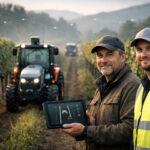Agtonomy, a California-based agtech startup, recently closed a $32.8 million Series A funding round aimed at advancing AI-driven automation in agriculture. The additional $10 million injection, led by Autotech Ventures, emphasizes Agtonomy’s goal of addressing two pressing issues: labor shortages and climate challenges in agriculture. This funding positions Agtonomy to accelerate its market expansion, especially within specialty crop sectors like vineyards and orchards, where labor dependency is high. With the growing demand for sustainable and efficient farming solutions, Agtonomy’s self-driving tractors could redefine labor dynamics in agriculture by offering automated, precision-based solutions for routine tasks.
Table of Contents
ToggleBackground on Agtonomy
Founded in 2021 by Tim Bucher and Valerie Syme, Agtonomy focuses on developing software that enables autonomous operation of agricultural equipment. By embedding its technology into established brands of tractors and implements, the company seeks to transform these machines into remotely operated, task-driven tools. The approach includes collaborations with key original equipment manufacturers (OEMs) like Bobcat, enabling rapid deployment of its technology across the agricultural sector. Agtonomy’s software currently facilitates tasks such as weeding, mowing, and maintenance for permanent crops. The goal is to allow operators to manage equipment from afar, using smartphones or other remote controls.
Labor Shortages in Agriculture
Labor shortages have been a persistent challenge for the agricultural sector, compounded by an aging workforce and diminishing interest in farming roles among younger generations. For instance, a recent case in Sonoma County highlighted the extent of the issue: a farm with 27 open tractor-driving positions received no applicants until it adopted Agtonomy’s autonomous system. When the roles were rebranded as “agtech operator” positions, they garnered immediate interest, particularly from candidates with skills in gaming and tech. Agtonomy’s approach exemplifies how autonomous technology can not only fill existing labor gaps but also appeal to a new workforce aligned with digital skill sets.
Impact of Agtonomy’s Technology
Agtonomy’s autonomous tractors aim to bring significant improvements in agricultural productivity. The tractors use AI-driven automation to perform tasks like mowing, weeding, and tillage with enhanced precision. By integrating machine learning and advanced GPS systems, these machines can ensure uniform planting and efficient harvesting, thereby maximizing crop yield. The technology is particularly transformative in specialty crop farming, where precision and timing are critical for high-value crops like wine grapes and citrus. As noted by industry experts, autonomous tractors can operate 24/7, freeing up farmers from routine, labor-intensive tasks and allowing them to focus on strategic management.
Additionally, Agtonomy’s software not only replaces manual labor but also augments decision-making on farms. This shift facilitates smarter farming practices, reduces human error, and increases overall efficiency. The tractors can be remotely operated through mobile apps, enabling farmers to manage equipment from a distance. Such advancements are expected to lead to cost savings, reduced dependency on seasonal labor, and greater profitability for farmers.
Broader Implications for Agriculture
The rise of autonomous farming technology has the potential to reshape the agricultural sector in profound ways. By automating routine tasks, self-driving tractors can help address labor shortages, which have been a persistent issue in agriculture across the U.S., Canada, and other major farming regions. Autonomous solutions not only fill existing labor gaps but also open new job pathways. For instance, the redefined roles of “agtech operators” have attracted younger workers who are tech-savvy and interested in digital skills, signaling a shift toward a more modern agricultural workforce.
Beyond labor dynamics, the environmental benefits of autonomous tractors are also noteworthy. Precision agriculture allows for targeted use of fertilizers, pesticides, and water, reducing the overall environmental impact. The integration of AI helps in monitoring soil conditions, detecting pest infestations, and optimizing resource use, which can minimize chemical runoff and water wastage. This makes autonomous farming a promising approach for achieving both sustainability and productivity goals in agriculture.

Challenges and Criticisms
Despite its potential, the adoption of autonomous farming faces several challenges. The high cost of implementation remains a major barrier, particularly for small and mid-sized farms. While large-scale operations may benefit from economies of scale, smaller farms might struggle with the initial investment required for autonomous machinery. Furthermore, reliable internet connectivity is necessary to operate and monitor these machines remotely—something that many rural farming areas still lack.
There are also concerns about potential job displacement. While Agtonomy and similar companies argue that automation reallocates rather than replaces labor, the broader impact on traditional farm workers is uncertain. Ethical considerations regarding the increasing role of AI in agriculture, including data privacy and decision-making autonomy, need careful attention. Industry stakeholders and governments must collaborate to ensure that the transition to autonomous farming is inclusive, with support mechanisms like training programs, financial incentives, and infrastructure development.
Future Outlook
Agtonomy is set to expand rapidly over the next few years following its successful $32.8 million Series A funding. The company plans to scale its operations significantly by broadening its technical team on the West Coast and entering new markets. One of its key objectives is to increase its paid pilot program for permanent crops by 500% by 2025, targeting not only vineyards but also nut and fruit tree growers across the U.S. To achieve this, Agtonomy will collaborate closely with prominent industry players, including E & J Gallo Winery and Treasury Wine Estates, to integrate its autonomous solutions into high-demand agricultural environments.
In addition, Agtonomy aims to enhance its technology by partnering with OEMs like Bobcat, ensuring its AI-driven software is embedded in thousands of tractors and other machinery. The company is also exploring broader applications for its technology in other industrial markets that require autonomous fleet management, positioning itself to lead in both agricultural and non-agricultural sectors.
Broader Market Trends
The global market for autonomous farming equipment is expected to grow significantly, with projections estimating a value of $95 billion by 2027. This surge is driven by the urgent need to improve efficiency, reduce labor reliance, and implement sustainable farming practices. Agtonomy’s approach aligns with these broader trends, focusing on the digitization of traditional farm tasks, increased automation, and the adoption of precision agriculture practices that aim to optimize resource use.
Advancements in technology, including AI, machine learning, and Internet of Things (IoT) integration, are reshaping farming operations by making them more data-driven. As agriculture continues to modernize, the role of autonomous solutions is expected to expand, facilitating not only higher productivity but also greater food security. Agtonomy’s strategy of integrating automation into brand-name agricultural equipment aligns well with this ongoing shift toward a more digital and resilient agricultural industry.
Conclusion
Agtonomy’s recent funding round is not just a financial milestone but a pivotal step toward transforming the future of farming. By addressing pressing challenges like labor shortages and climate change, the company’s AI-driven automation solutions have the potential to redefine the agricultural landscape. While challenges related to cost, accessibility, and job displacement remain, Agtonomy’s farmer-focused innovation model offers a promising pathway for sustainable growth. As the company continues to scale its operations and pilot programs, its role in modern agriculture will likely expand, making it a key player in the shift toward autonomous and sustainable farming practices.




